nones

WASHINGTON — In the most comprehensive study of American Jews in 12 years, a strong majority said being Jewish is mostly about ancestry or culture, not the religious practice of Judaism.
“A Portrait of Jewish Americans,” released Tuesday by the Pew Research Center, shows strong secularist trends most clearly seen in one finding: 62 percent of U.S. Jews said Jewishness is largely about culture or ancestry; just 15 percent said it’s about religious belief.
“Non-Jews may be stunned by it,” said Alan Cooperman, co-author of the study. “Being Jewish to most Jews in America today is not a matter of religion.”
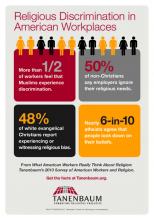
The American workplace, like the rest of U.S. society, is becoming more religiously diverse and that is raising concerns about employer accommodations for believers — and increasing the odds for uncomfortable moments around the water cooler.
Yet one potential flashpoint among workers does not involve new immigrant faiths but rather two indigenous communities: white evangelicals and unaffiliated Americans who constitute one of the fastest-growing segments of the population.
A major factor contributing to workplace conflict, according to a survey released on Friday, is that evangelicals — whose religious identity is tied to sharing their beliefs — are much more likely to talk about their faith at work than other religious and nonreligious groups.
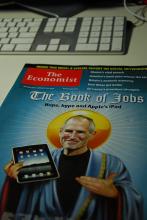
The new movie about Steve Jobs is short on anything explicitly religious. Like its main character, however, it’s got a thread of transcendence running through it.
The truth about Jobs and religion may be that, in this arena as in others, he was ahead of the cutting edge.
The film isn’t making the purists happy, in part because it takes too many liberties with history. But it’s not a documentary. I’ll go against many of the reviews and say that Ashton Kutcher does a pretty good job at representing the personality found in Jobs’ speeches and in what has been written about Jobs — particularly in the massive authorized biography by Walter Isaacson.
One quote in that book, from one of Jobs’ old girlfriends, pretty much captures the character in the film: “He was an enlightened being who was cruel,” she told Isaacson. “That’s a strange combination.”

Nearly half of all Americans — 48 percent — say the growing number of nonreligious people is “bad for society,” according to a poll conducted by the Pew Forum on Religion and Public Life.
But about the same amount — 50 percent — say the rise in nonreligious people is either a good thing (39 percent), or doesn’t matter (11 percent).
The findings flesh out last year’s Pew Forum survey on the “nones,” the one in five Americans who report no formal religious affiliation. But the results also illustrate the divided reactions to this trend between those who are religious and those who are not.
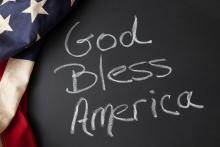
When it comes to God and country, white evangelicals report the strongest levels of patriotic feelings in a new poll, with more than two-thirds (68 percent) saying they are extremely proud to be an American.
That figure was markedly higher than for white mainline Protestants (56 percent), minority Christians (49 percent), Catholics (48 percent) and religiously unaffiliated Americans (39 percent), according to the study, conducted by the Washington-based Public Religion Research Institute in partnership with Religion News Service.
White evangelicals are also more likely than any other religious group surveyed to believe that God has granted the U.S. a special role in history (84 percent) and to say they will likely attend a public July 4th celebration (62 percent).
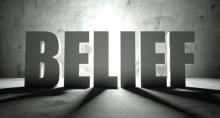
There are lots of biases and assumptions about Christians out there, many of which are founded in real-life experience. And yes, we Christians have done our share of damage when it comes to tarnishing our so-called “brand.” But there also seems to be this tendency to understand Christianity and its adherents as one generally monolithic group that can be described in simple (often negative) terms that they would never be acceptable to apply to any other group.
Part of this is because of the historic dominance of the Christian culture in the modern Western world. It’s the same reason that stereotypes of men on network sitcoms are pervasively unflattering, while the same stereotypes would cause a firestorm of negative publicity if applied to the female counterparts. Some of this is entirely warranted and necessary in tearing down false or damaging constructs of power. But sometimes, if we’re being honest, they’re just wrong. And stupid.

Many Christians have a confidence problem. They love Christ but are ashamed of everything associated with him. They want to be known as a Christian — just not that type of Christian. You know the type: the Westboro Baptists of the world; the scumbag televangelists on late-night cable; the fear-mongering preachers spewing apocalyptic prophecies; the proselytizers that scream at people outside of baseball stadiums; the celebrities claiming stupid things in the name of God; the “friends” who post bigoted messages on Facebook; the politicians who manipulate faith communities to serve their agendas; the anti-science, anti-environment, anti-women, anti-homosexuality, and anti-everything Christians who basically spread negativity wherever they go — the people who drag Christ’s name through the mud.
Today’s believers are hypersensitive and self-aware about the current events happening within media and culture, and in a society obsessed with consumerism, corporate loyalty, branding, product placement, and publicity, they understand that the Christian reputation is experiencing a fast decline, and they feel guilty by association.
This decline is not just happening in the “secular world,” but also within faith communities. Infighting, criticism, and self-deprecation are rampant within the American Church, and much of this is deserved, but it also reflects a corporate Christian identity that feels embarrassed and humiliated.

I’ve experienced some strange extremes lately. First, I attended – and spoke at – the Subverting the Norm conference in Springfield, Mo., where we took some time to consider how, if at all, so-called “radical theology” could exist within today’s religious systems. Then I got home and found my latest TIME Magazine, with a cover story titled “The Latino Reformation,” which reveals what most within Protestantism have known for some time: formerly Catholic Latino Christians are dramatically reshaping the face of the American Christian landscape.
Interestingly, there is little-to-no overlap between these two groups – a point which was made clear to me by the fact that there were very few people of color in attendance at Subverting the Norm. One comment, from an African-American woman who was there, was that the very focus of the conference (on academic, esoteric questions of theology and philosophy) assumed the kind of privilege still dominated by middle-class white males. Put another way: while we’re busy navel-gazing and discussing the meaning of Nietzsche’s “death of God,” non-Anglo religious leaders were busy dealing with real-world problems right in front of them.
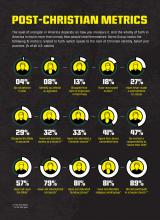
Here are the criteria for post-Christianity according to Barna:
1. do not believe in God
2. identify as atheist or agnostic
3. disagree that faith is important in their lives
4. have not prayed to God (in the last year)
5. have never made a commitment to Jesus
6. disagree the Bible is accurate
7. have not donated money to a church (in the last year)
8. have not attended a Christian church (in the last year)
9. agree that Jesus committed sins
10. do not feel a responsibility to “share their faith”
11. have not read the Bible (in the last week)
12. have not volunteered at church (in the last week)
13. have not attended Sunday school (in the last week)
14. have not attended religious small group (in the last week)
15. do not participate in a house church (in the last year)
As I read through the list I am struck by the evangelical bias. There are very specific practices included in this list (Bible study, house churches, sharing the faith, small group attendance, Sunday school) that reveal this bias. They are asking about practices they consider normative, their presence and their absence. There is no mention of receiving the Eucharist, charitable giving, or social outreach such as volunteering in a soup kitchen.
Let me be clear, I am not judging them positively or negatively on their list. Instead, I'm intrigued ... deeply and profoundly intrigued, truth be told.
This Easter, Teresa MacBain will mark an anniversary that’s uncommon for an ordained minister — her first year as an atheist.
Last March, MacBain, now 45, stood at a podium before hundreds of people in a Maryland hotel ballroom at the national convention of American Atheists and told them that, after a lifetime as a Christian and 15 years as a pulpit pastor, she had lost her faith.
Her coming out was national news, and she expected it would cost her her position as pastor of a United Methodist church, and she expected she might lose some friends and family members. In the last year, she has lost all those things.
But there have been gains, too, including a new career, the embrace of a new community that she had been taught to distrust and a newfound sense of confidence.

I’ve been reading with interest about the “nones” and the increasing number of people who identify themselves as SBNR — spiritual but not religious. Though I try not to get sucked down Internet rabbit holes, I have to admit this one’s got my number. I think it’s because I identify with both groups in some real ways.
Like many people I know, I stand in the gap.
As a Catholic Christian, I’ve watched countless friends and neighbors walk out of the church. Some linger at the door on their way out with a wistful look, wishing things could be different. Others hit the ground running and never look back. I understand both exit strategies and have been tempted to join them, but I haven’t, not yet. I am spiritual, but also still religious, albeit reluctantly so at times.
As much as I appreciate the conversations that are going on, we “religious” aren’t going to change anyone’s minds by talking about it, by beating our breasts, or wringing our hands. The “nones” aren’t going to walk back into church, because someone tells them they should, or because it would be good for them. Shoulds are rarely effective with adults and if churches were actually good for them, in some tangible way, the “nones” would still be there in the first place.
I think the only way for churches to reverse the exodus of the “nones” is by becoming different churches.

Much has been made of the "rise of the nones" — that is, the increasing percentage of Americans who identify with no religion. It is a fascinating and undeniable trend, and one that should catch the attention of religious leaders.
I know quite a few Nones. Few of them were raised in the absence of any faith tradition. Instead, most were part of a Christian denomination at some point, but consciously made the decision to leave. What interests me about their stories is this common thread: The majority left Christianity because of the attitudes of a person, and that person was not Jesus. It was an overbearing parent, or a judgmental minister, or a congregant who told them they did not belong because they were gay or they were questioning or they had conflicted ideas. In many cases, it was a combination of these types of influences.
Something is wrong when we drive so many people away. I think a big part of that something is arrogance.
This raises the question, then, of how to be a public Christian, even an evangelical Christian (which is how I identify myself), without running the risk of arrogance.
I don't embody the ideal I'm about to describe in answer to that question, but I know some people who do. These are the people who made me want to be a Christian. What I see in them are three key attributes: They are authentic, unashamed and honest.
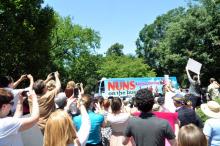
WASHINGTON — From the nuns to the “nones,” religion dominated the headlines throughout 2012. Faith was a persistent theme in the presidential race, and moral and ethical questions surrounded budget debates, mass killings, and an unexpected focus on “religious freedom.”
Here are 10 ways religion made news in 2012:
Suffer the children: Gun violence as a new “pro-life” issue
A shooting rampage that killed 12 and injured more than 50 others inside a crowded movie theater in Aurora, Colo., couldn’t do it. Neither could a gunman who murdered six people at a Sikh temple in Oak Creek, Wis. But a hail of bullets inside Sandy Hook Elementary School in Newtown, Conn. – which took the lives of 20 first-graders, and six adults – was finally able to mobilize religious activists on gun control after years of failing to gain traction.
“Those who consider themselves religious or pro-life must be invited to see that the desire to prevent gun-related deaths is part of the religious defense of the dignity of all life,” wrote the Rev. James Martin, a Jesuit priest and contributing editor at America magazine.

A new report on global religious identity shows that while Christians and Muslims make up the two largest groups, those with no religious affiliation — including atheists and agnostics — are now the third-largest “religious” group in the world.
The study, released Tuesday by the Pew Forum on Religion & Public Life, found that more than eight in 10 (84 percent) of the world’s 7 billion people adheres to some form of religion. Christians make up the largest group, with 2.2 billion adherents, or 23 percent worldwide, followed by Muslims, with 1.6 billion adherents, or 23 percent worldwide.
Close behind are the “nones” — those who say they have no religious affiliation or say they do not believe in God — at 1. 1 billion, or 16 percent. That means that about the same number of people who identify as Catholics worldwide say they have no religion.
“One out of six people does not have a religious identity,” said Conrad Hackett, a primary researcher and demographer on the study. “But it is also striking that that overwhelming majority of the world does have some type of religious identity. So I think people will be surprised by either way of looking at it.”
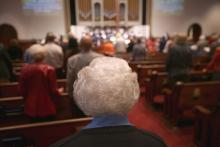
I empathize with people fleeing the local church. Churches can be battlefields instead of harbors, pits of condemnation or politics rather than wells of living water.
But the endless search for something “new” has trumped the life-changing story the body of Christ has nurtured and passed on for 2,000 years. This transforming story is the story the churches enacted weekly in Word and Sacrament before they forgot their original vocation as shelters of truth, life, and light amidst lies, death, and darkness. There were four revealed ways Jesus was present at the center of their public gatherings. These ways have been lost in too many places but are waiting to be rediscovered. More on that in a moment.
A young woman, a house church attendee, told me she longs for solid pastoral guidance, a message prepared weekly by an authoritative teacher, for worship that places Jesus Christ at the exact center of a public space where everyone is welcome, a place where she can bring her disbelieving friends whose lives are not yet transformed by self-sacrificial Love, a place where they can speak openly and honestly about where their lives still remain isolated from a holy God, a place of worship that does not lean on any one person's (or her personal) understanding and articulation of the Gospel but on the collective wisdom of the body of Christ.

Last month, Lauren Anderson Youngblood, communications manager for the Secular Coalition for America, approached Broderick Johnson, a senior adviser to the Obama campaign, as they both left a conference on religion and the election.
The SCA is an umbrella group representing 11 nontheistic organizations. So who, Youngblood asked Johnson, could she reach out to with their concerns about civil rights, access to health care and education?
“He said, ‘We don’t view you as a constituency,’” Youngblood said. “He said, ‘We don’t do outreach to that community.’”
After Tuesday's election, that may soon change. According to a Pew Forum on Religion & Public Life study released last month, “nones” — those who say they have no religious affiliation or do not believe in God — are the fastest-growing faith group in America, at 20 percent of the population, or 46 million adults.
In addition, nationwide exit polls conducted Tuesday show that "nones" made up 12 percent of all voters — more than the combined number of voters who are Jewish, Muslim or members of other non-Christian faiths (9 percent), and only slightly smaller than the combined number of Hispanic Catholics and Black Protestants (14 percent).
Editor's Note: Sojourners has launched this new blog series to help shed light on the nation's latest "religious" affiliation. Go HERE to read their stories. Or EMAIL US to share your own.
PBS Religion & Ethics Newsweekly has wrapped up its three-part new mini-series on the rise of the unaffiliated. Go HERE to read more about this week's episode.
Watch None of the Above: Religious Implications on PBS. See more from Religion & Ethics NewsWeekly.

 There has been much speculation about “the nones,” the increasing number of people who do not identify with any particular religious denomination. The poll, conducted by the Pew Research Center, shows that nearly one-fifth of all Americans and nearly one-third of young people under 30 are unaffiliated with a particular religion or denomination. There have been varying reactions. As Mark Tooley points out, this isn’t necessarily a crisis of faith in America; many “nones” still profess to believe in God or some ultimate being. The rise of the “nones” could then be pointing to a crisis in denominational loyalty.
There has been much speculation about “the nones,” the increasing number of people who do not identify with any particular religious denomination. The poll, conducted by the Pew Research Center, shows that nearly one-fifth of all Americans and nearly one-third of young people under 30 are unaffiliated with a particular religion or denomination. There have been varying reactions. As Mark Tooley points out, this isn’t necessarily a crisis of faith in America; many “nones” still profess to believe in God or some ultimate being. The rise of the “nones” could then be pointing to a crisis in denominational loyalty.
There are also those who wish to eschew the label of religious all together, seeing it as increasingly connected to political conservatism, homophobia, and sexism (according to the poll, a “none” is more likely to vote Democratic and affirm the legalization of abortion and same-sex marriage).
In one of an ongoing series of blog posts entitled “Meet the Nones," Alyssa Bain writes, “I am more and more hesitant to label myself Christian as I see traditional denominations come to the spotlight for being closely affiliated with so-called right-wing politics. Instead, I distance myself.”
I write today to add my two cents. The truth is for most of my life I was a “none." I’ve only been a professing Christian for a very short time and I was not raised in any particular religious tradition at all. Though I identify as Eastern Orthodox and have been going to Orthodox services for over a year now as a catechumen, I have not been formally received into the church and still await my baptism and chrismation (I have never been baptized in any denomination, even as an infant).

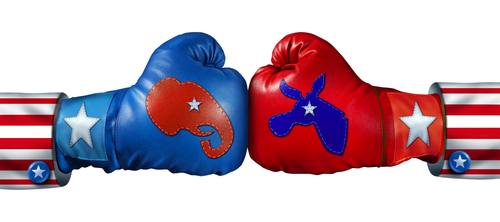 Monday night, I hit a new low. During the last presidential debate, I found myself arguing via Facebook about faith and politics … with a fellow pastor’s wife. Let’s just say, I managed to break each of Eugene Cho’s 10 commandments with my snark.
Monday night, I hit a new low. During the last presidential debate, I found myself arguing via Facebook about faith and politics … with a fellow pastor’s wife. Let’s just say, I managed to break each of Eugene Cho’s 10 commandments with my snark.
She who shall not be named suggested that anyone willing to support a certain candidate must be blind, stupid, or foolish. When I made it clear that I have prayed and reviewed the facts and would be supporting said candidate, I was told that my “prayers must not be backed by the Word of God.” I was then lambasted for my so-called "unbiblical" views. Oh, no she didn’t!
Aside from feeling personally attacked, I was more frustrated that this kind of bad theology remains in the church. It’s no wonder that more and more people of faith are identifying as the “nones”— or none of the above when it comes to religious beliefs. Who wants to be associated with Christianity — Protestant, Evangelical, Catholic, Orthodox, etc. — and the Church when they are often dominated by such judgmental people who dare to speak for God?

The largest slice of President Barack Obama’s religious coalition -- at 23 percent -- is not very religious.
They’re the “nones,” also known as unaffiliated voters, according to a new American Values Survey by the Public Religion Research Institute.
Gov. Mitt Romney’s biggest bloc of religious voters are white evangelical Protestants, at 37 percent, followed by white mainline Protestants and white Catholics, each at 19 percent. Comparing the candidates' supporters, the more diverse religious and nonreligious coalition that's favoring Obama tends to be younger and growing, which could make it easier for Democrats to win elections in the future.
But there’s a down side for Obama, said Dan Cox, PRRI’s research director.
“The people most likely to support him are the least likely to vote: Latinos, the millennials (voters 18-29), and the unaffiliated,” Cox said.